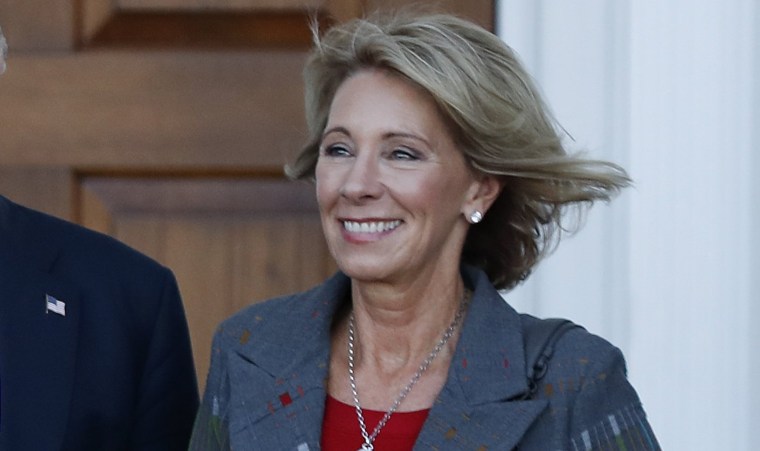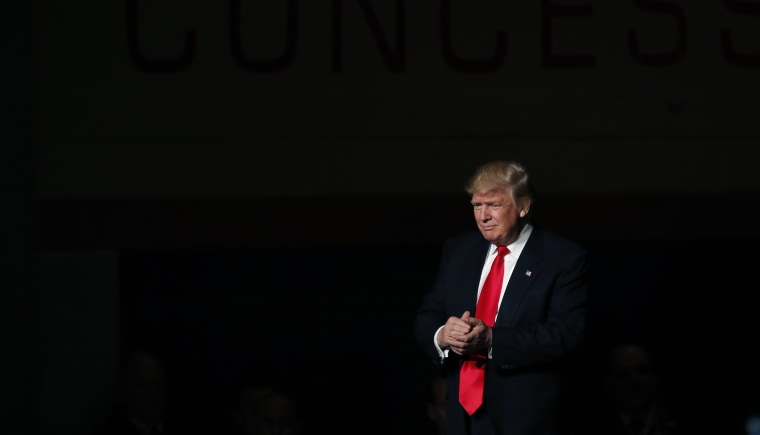With Democrats unable to stop President-elect Donald Trump's Cabinet picks on their own, they're hoping that increased scrutiny on his nominees will do it for them.
As the minority party in the Senate with little real recourse at their disposal, uncovering something disqualifying may be Democrats' last best hope to block some Trump selections that they view as unacceptable and outside the political mainstream.
Even if they don't have the votes to shoot down any nominees, Democratic senators will grill them in committee hearings. They can slow the confirmation process with procedural moves or try to shame them — all in the service of trying to peel off the three Republican votes they would need to kill a nomination or force the Trump White House to withdraw the pick.
Related: ExxonMobil CEO Expected as Secretary of State Pick
Not all of Trump's picks will face such aggressive scrutiny, which Democrats insist is not merely reflexive partisan opposition. Retired Gen. James Mattis is expected to sail through his confirmation to be defense secretary, even though his recent tenure in the active-duty military means he'll need a special waiver that requires 60 votes in the Senate.
But some of Trump's picks, Democrats say, represent existential threats to the basic mission of the departments they've been tapped to lead, and so the nominees have no business in those jobs.

There's Trump's reported pick for secretary of state, Rex Tillerson, chief executive of oil giant ExxonMobil, who has warm relations with Russian President Vladimir Putin. There's Trump's pick to head the Environmental Protection Agency, Scott Pruitt, who has made a name for himself by suing the agency. There's Andy Puzder, Trump's choice for the Labor Department, a fast food executive who wants to replace workers with robots.
There's Betsy DeVos, a school choice advocate seen as hostile to public education, whom Trump wants to put in charge of the Education Department. And there's attorney general nominee Jeff Sessions, an anti-immigration hard-liner whom the Senate once rejected for a federal judgeship over past racially insensitive comments.
Related: Donald Trump's Cabinet Picks So Far
Democratic congressional aides and outside groups will spend the coming weeks poring over the financial statements, personal histories and public utterances of Trump's most polarizing Cabinet selections, hoping to find information that could turn them into the next Tom Daschle or Zoe Baird — Barack Obama and Bill Clinton Cabinet nominees who were forced to withdraw after damaging issues came to light during the confirmation process.
And Democrats have reason to believe Trump's nominees provide an especially rich vein for digging, because according to reports, few have been subjected to a traditionally thorough vetting process by his transition team. Many are wealthy business executives with sprawling financial entanglements and no political experience or the scrutiny that comes with it.
"What's unusual about Trump's Cabinet picks is that so few of them come from politics, which means that they're going to have a harder time than usual going through the traditional vet and public evaluation," said Simon Rosenberg, president of the Democratic think tank NDN. "Some of them are going to crash. Some of them aren't going to make it because of things that are going to come up in their background."
Democrats will have to pick their battles, and priorities will likely be decided based not only by how threatening they find Trump's nominees, but how vulnerable the nominees are after some digging.
Related: Donald Trump Builds Cabinet with Old Friends and Some Rivals
"Much of it depends on what's uncovered in the vetting process," said Jim Manley, a former aide to Senate Democratic leader Harry Reid of Nevada. "As Senator Daschle found out, one little thing can trip you up."
Daschle was nominated to head the Department of Health and Human Services in 2009 but removed his name after controversy over his taxes emerged.
Old domestic abuse allegations related to a messy divorce have already surfaced with Puzder. But complicated financial issues are more likely to trip up Trump's nominees than personal indiscretions, especially given the number of super-wealthy candidates Trump has chosen.
"The Senate Finance Committee has developed a reputation as somewhat of a killing field for nominees in recent years," Manley said. "They've developed the experience to really pick apart the financials."
And Trump's team may be flying blind to some extent. His transition team has reportedly forgone the rigorous vetting process traditionally performed on potential nominees before they are announced publicly, leaving his picks potentially vulnerable to surprises.
Selecting Rep. Mike Pompeo, R-kansas, as CIA director was "pretty simple," said Rep. Devin Nunes, R-California, who is working on Trump's transition team.
"They asked me who would be the person for the agency, and I said without a doubt that Pompeo would be a great pick," Nunes told Politico.
Dan Kanninen, a former Obama White House official who helped choose candidates for jobs in the Environmental Protection Agency, said it takes weeks or months for even the best transition teams to properly vet candidates.
"With Trump, none of that, as far as we can tell, happened before the election. And now, if it is happening at all, it's happening in a matter of days based on the gut on the president-elect," he said. "It would not surprise me at all, given how little we know — and frankly how little the Trump team knows — if something came up with of a magnitude that might kill some of their nominations."
Even under the best of circumstances, things get missed. Clinton rescinded Baird's nomination to be attorney general because it was discovered that she had hired an undocumented immigrant as a nanny.
The Senate confirmation process can be brutal even for squeaky clean candidates who have spent their whole careers in government. A "Survivor's Guide for Presidential Nominees" prepared by the National Academy of Public Administration, a congressionally chartered non-profit, stretches over 71 pages and warns, "If you are not nervous going into your confirmation hearing, you should be."
It may be especially bumpy for Trump's nominees from the private sector, who are not accustomed to government processes and who have not already gone through the kind of public and legal scrutiny politicians and government officials are used to.
Three years ago, facing Republican obstruction, Senate Democrats decided to kill the filibuster for executive branch appointments, which means they now cannot force Republicans to find the 60 votes needed to break a filibuster. Republicans need only 51 votes in the Senate to confirm Trump's Cabinet picks.
Democrats would need three Republicans to join them to shoot down any of Trump's nominees, and so far none have expressed interest in taking up the cause.
Some Democrats, unsurprisingly, are having buyer's remorse about the filibuster change, including Reid's successor as Democratic Leader, Sen. Chuck Schumer of New York.
"I wanted 60 for Supreme Court and Cabinet, but I didn't prevail," Schumer told The Washington Post.
Still, he vowed opposition to some nominees, however possible. "If it's somebody who is out of the mainstream," Schumer said, "we'll fight tooth and nail and use every tool we have."
Related: Trump's Cabinet Picks Have a Combined Wealth of $14.5B. How Did They All Make Their Money?
The Senate has traditionally deferred to new presidents' wishes in filling out their Cabinets, approving many nominees without bothering to even take formal votes.
Recent incoming presidents have had to withdraw only one or two Cabinet picks, if any at all, and the Senate has voted to outright reject just three nominees in the past 100 years, according to the Senate historian.
But Democrats are in no mood to be deferential to Trump after Republicans, in their view, broke with tradition by obstructing Obama Supreme Court pick Merrick Garland for nine months and fought the confirmation of his second attorney general, Loretta Lynch.
And they say Trump has chosen blatantly provocative or unqualified nominees, instead of trying to find common ground in a divided country.
"Donald Trump is kind of giving a big middle finger to that entire department by nominating someone who was found to have 50 percent of his restaurants in noncompliance with labor laws," Sen. Chris Murphy, D-Connecticut, told MSNBC on Friday of Trump's decision to name Puzder to head the department responsible for protecting workers.

